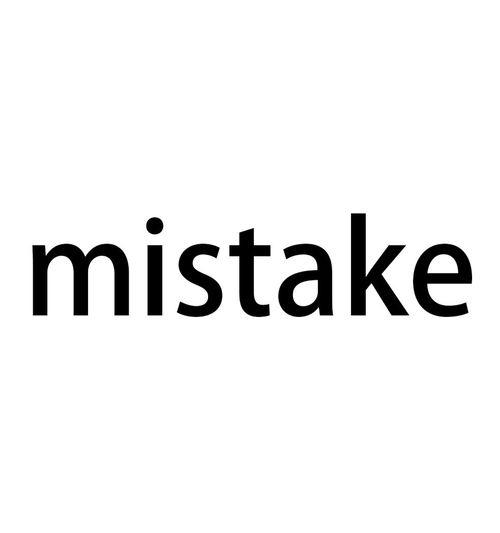Mystake: A Comprehensive Overview
Have you ever found yourself in a situation where you made a mistake, and it felt like the world was crashing down around you? Well, you’re not alone. Mistakes are a part of life, and they can happen to anyone. In this article, we will delve into the various dimensions of making mistakes, from the psychological impact to the practical steps to learn from them. So, let’s embark on this journey of understanding and growth.
Understanding the Psychological Impact of Mistakes

Making mistakes can be a daunting experience, often leading to feelings of guilt, shame, and self-doubt. However, it’s important to recognize that these emotions are a natural response to our human tendency to strive for perfection. Here are some key psychological aspects to consider:
| Emotion | Explanation |
|---|---|
| Guilt | Feeling responsible for a mistake can lead to guilt, as we believe we have let ourselves or others down. |
| Shame | Shame arises when we perceive ourselves as inadequate or flawed due to our mistakes. |
| Self-doubt | Mistakes can shake our confidence, making us question our abilities and worth. |
While these emotions are uncomfortable, they are also opportunities for growth and self-reflection. By acknowledging and understanding these feelings, we can begin to work through them and move forward.
Types of Mistakes and Their Consequences

Mistakes can take many forms, and their consequences can vary widely. Let’s explore some common types of mistakes and their potential outcomes:
1. Errors in Judgment: These occur when we make poor decisions based on incomplete information or flawed reasoning. The consequences can range from minor inconveniences to significant setbacks.
2. Technical Mistakes: These involve errors in execution, such as a typo or a miscalculation. While they may seem trivial, they can have a ripple effect, leading to further mistakes or misunderstandings.
3. Ethical Missteps: These occur when we violate ethical principles, such as honesty or integrity. The consequences can be severe, including damage to our reputation and trustworthiness.
4. Human Errors: These are mistakes made by individuals due to factors like fatigue, distraction, or lack of training. They can lead to accidents, injuries, or financial losses.
Learning from Mistakes: A Practical Approach

While mistakes can be painful, they also offer valuable lessons. Here are some practical steps to help you learn from your mistakes:
-
Reflect on the situation: Take the time to understand what went wrong and why. This can help you identify patterns or areas for improvement.
-
Assess the consequences: Consider the impact of your mistake on yourself and others. This can provide perspective and help you prioritize future actions.
-
Develop a plan for improvement: Identify specific steps you can take to prevent similar mistakes in the future. This may involve acquiring new skills, seeking feedback, or adjusting your approach.
-
Seek support: Don’t hesitate to reach out to friends, family, or colleagues for guidance and encouragement. They can offer valuable insights and help you stay motivated.
Embracing Mistakes as Opportunities for Growth
Ultimately, the key to overcoming mistakes lies in our mindset. By embracing them as opportunities for growth, we can transform our experiences into valuable lessons. Here are some ways to cultivate a growth mindset:
-
Reframe your perspective: Instead of viewing mistakes as failures, see them as stepping stones to success.
-
Practice self-compassion: Be kind to yourself when you make mistakes. Remember that everyone makes errors, and it’s how we respond to them that matters.
-
Stay curious: Approach mistakes as opportunities to learn and grow. Ask yourself questions and seek out new information.
-
Embrace resilience: Develop the ability to bounce back from setbacks and keep moving forward.
